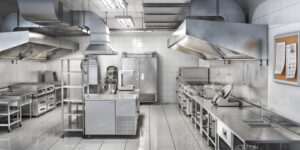A restaurant’s kitchen is its beating heart, the engine that drives its culinary creations and sustains its operations. In the dynamic food scene of Los Angeles, where innovation and competition thrive, maintaining a functional and efficient kitchen is crucial for success. However, there comes a time in every restaurant’s lifespan when the need for kitchen remodeling becomes inevitable. In this article, we delve into the signs indicating when a Los Angeles restaurant should consider a kitchen renovation, exploring the various factors that necessitate such a decision.
Outdated Equipment
-
- One of the primary indicators that a Los Angeles restaurant needs kitchen remodeling is outdated equipment. In a city known for its culinary prowess and cutting-edge dining experiences, using obsolete appliances can hinder efficiency and compromise the quality of dishes.
- Advancements in technology have led to the development of energy-efficient and high-performance kitchen equipment. Upgrading to modern appliances not only enhances productivity but also reduces energy costs and maintenance expenses.
- Additionally, outdated equipment may fail to meet current health and safety standards, putting the restaurant at risk of violations and potential fines.
Inefficient Layout
-
-
- The layout of a restaurant kitchen plays a pivotal role in its functionality and workflow. An inefficient layout can lead to bottlenecks, congestion, and delays in food preparation, ultimately affecting customer satisfaction.
- As restaurants evolve and expand their offerings, their kitchen layouts may no longer accommodate the increased demand or changing menu requirements. Remodeling allows for reconfiguring the space to optimize workflow and streamline operations.
- Collaborating with experienced kitchen designers can help restaurant owners redesign their kitchens to maximize efficiency, improve ergonomics, and create a conducive environment for culinary creativity.
-
Compliance with Regulations
-
-
-
- Los Angeles, like any major city, imposes stringent regulations and codes governing restaurant operations, including kitchen facilities. Failure to comply with these regulations can result in fines, closure orders, and damage to the restaurant’s reputation.
- Over time, changes in regulations or updates to building codes may necessitate modifications to the kitchen layout, ventilation systems, fire safety measures, and sanitation practices. Remodeling allows restaurants to ensure compliance with current standards and avoid potential legal issues.
- Investing in upgrades such as improved ventilation, grease traps, and food storage facilities not only ensures regulatory compliance but also enhances the overall safety and hygiene of the kitchen environment.
-
-
Enhancing Ambiance and Brand Image
-
-
-
-
- The ambiance of a restaurant extends beyond its dining area to include the kitchen, which serves as a stage for culinary performance. A visually appealing and well-designed kitchen enhances the overall dining experience and reinforces the restaurant’s brand identity.
- Remodeling offers an opportunity to align the aesthetics of the kitchen with the restaurant’s theme, decor, and branding elements. Whether it’s a sleek modern kitchen in a contemporary restaurant or a rustic-chic design in a farm-to-table eatery, the ambiance should reflect the restaurant’s personality.
- Investing in quality materials, finishes, and lighting fixtures can transform a mundane kitchen into a focal point of the dining establishment, attracting patrons and earning rave reviews.
-
-
-
Catering to Evolving Trends
-
-
-
-
-
- The restaurant industry is constantly evolving, driven by shifting consumer preferences, culinary trends, and market dynamics. To stay competitive and relevant, restaurants in Los Angeles must adapt to these changes, which often necessitate kitchen remodeling.
- Emerging trends such as open kitchens, interactive cooking stations, and sustainable practices require modifications to the kitchen layout and equipment. Remodeling allows restaurants to embrace these trends and position themselves as leaders in innovation.
- Moreover, as consumer demand for healthier, locally sourced ingredients continues to rise, restaurants may need to reconfigure their kitchens to accommodate fresh produce, organic meats, and plant-based alternatives.
-
-
-
-
Conclusion
In the vibrant culinary landscape of Los Angeles, maintaining a state-of-the-art kitchen is essential for restaurants striving to thrive in a competitive market. Whether driven by outdated equipment, inefficient layouts, regulatory compliance, brand enhancement, or evolving trends, the decision to do kitchen remodeling Los Angeles is a strategic investment in its long-term success. By recognizing the signs indicating the need for remodeling and collaborating with experienced professionals, restaurant owners can revitalize their kitchens, elevate their dining experiences, and solidify their position as culinary destinations in the City of Angels.


